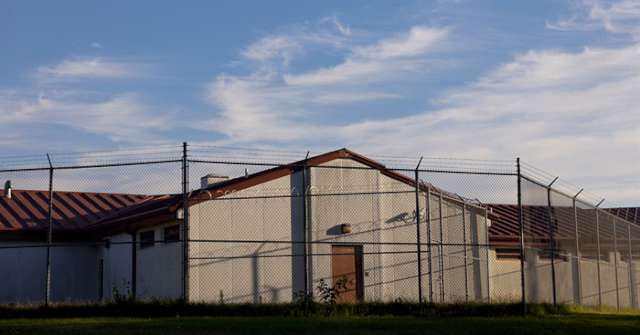
Franklin Detention Center Closes

Published on January 4 2024 10:52 am
Last Updated on January 4 2024 10:54 am
The Franklin County Juvenile Detention Center in Benton, Illinois, was called a “facility in crisis” by state auditors last year. (Julia Rendleman for ProPublica)
Capitol News Illinois
mparker@capitolnewsillinois.com
This article was produced for ProPublica’s Local Reporting Network in partnership with Capitol News Illinois.
The judge responsible for the administration of a troubled juvenile detention center in rural southern Illinois abruptly moved to close it as of Dec. 31, citing staffing shortages that made it difficult to meet new state standards governing the treatment of youth in custody.
The Franklin County Juvenile Detention Center had been featured in a November report by Capitol News Illinois and ProPublica that exposed the state’s lax enforcement of its own standards, despite audits that repeatedly found poor conditions at the facility.
Those standards were updated by the Illinois Department of Juvenile Justice in 2021; the changes aimed to improve education and mental health services for detained youths, and to limit the use of restraints and seclusion, or locking kids alone in their cells for hours. But in an inspection the following year, the state agency described the Franklin County Juvenile Detention Center as a “facility in crisis”: It did not provide the required mental health care, schooling and recreation for the children in custody, and staff locked youth in their rooms for up to 24 hours for behavioral infractions or because of short staffing. Facilities are only allowed to use seclusion to prevent someone from harming themselves or others.
That same year, the Illinois Supreme Court, which shares oversight of the state’s juvenile detention centers, also found that the Franklin County center did not meet its standards. In the summer of 2023, the facility was sued by the American Civil Liberties Union of Illinois, alleging it had violated youths’ constitutional rights by subjecting them to excessive forms of restraint and seclusion while denying them adequate education and mental health services. The facility had still not come into compliance as of the end of 2023.
In the face of these reports, in the late summer and fall of last year, the Franklin county board publicly debated the fate of the building, which is owned by the county. In hopes of keeping the juvenile detention center open, the board approved about $200,000 for upgrades. Earlier, workers’ salaries had also increased from $28,000 to $43,000 annually, according to the juvenile justice department’s January 2023 audit.
The November article by Capitol News Illinois and ProPublica found that some of the conditions noted by state auditors more than a year prior had continued at the facility in Benton, as well as in some of the other 15 juvenile detention centers where problems had been identified.
The news organizations’ reporting also revealed that the center’s staff often relied on backup from the local sheriff’s office, which sometimes used restraints in ways that are not typical or not allowed in juvenile detention centers, as law enforcement records obtained by Capitol News Illinois showed. Franklin County Sheriff Kyle Bacon defended the actions of his deputies and said that he did not believe his office was bound by the state standards for juvenile detention centers as his office was not involved in the center’s administration.
Despite these mounting concerns, the closure of the Benton detention center took some county officials, state lawmakers and employees by surprise. One longtime employee told county officials during a Tuesday night board meeting that staff were “blindsided” by the announcement four days before Christmas.
Two state lawmakers who represent the region, Rep. Dave Severin, R-Benton, and Sen. Terri Bryant, R-Murphysboro, expressed frustration that they had not been made aware of closure plans in advance and had learned of them from an employee after the decision was made.
Melissa Morgan, chief judge of the 2nd Judicial Circuit Court of Illinois, who made the closure decision, declined an interview through her administrative assistant.
Her court issued a statement about the closure late last week. It did not mention the critical audits, but it did say “workforce shortages” made it difficult to comply with the new standards and laws.
Youth detention facilities in Illinois operate like adult jails and hold youth in custody while their cases are pending in court. When the 32-bed facility closed last month, it housed only a handful of youth, though it was designated as a holding place for 26 southern Illinois counties — the lower quarter of the state. Most youth from those counties will now be sent to facilities in metro-east Illinois, bordering St. Louis, or out of state, potentially moving them further from their support systems.
The news organizations’ November reporting highlighted the fact that Illinois officials charged with inspecting the detention centers have little authority to enforce compliance. State Sen. Rachel Ventura, D-Joliet, said that she is in talks with state and court officials about how to strengthen that oversight. She said the many layers of government involved complicates the process, but she plans to propose legislation in the spring session of the Illinois General Assembly that would streamline the process for closing facilities.
Kevin Fee, a staff attorney with the ACLU of Illinois, said that his organization sued the facility in June when it found that the troubling state audits had not led to improvements.
Lawyers for the court and the county denied the allegations in court filings in November. The case is pending, though it may be rendered moot because it sought to improve conditions for youth into the future, not to win remedies for those it alleged had been previously harmed.
“I think that the closure of the facility is a good outcome, and we read it as an acknowledgement that the facility really has not been serving the youth that it houses adequately for some time, as we alleged in our lawsuit,” Fee said. “We hope that other facilities in the state that house youth will use this to measure their own conditions, and we’ll continue to monitor them.”












